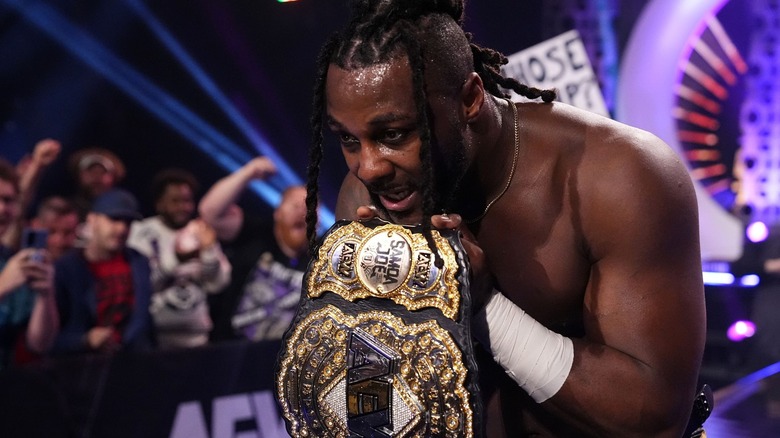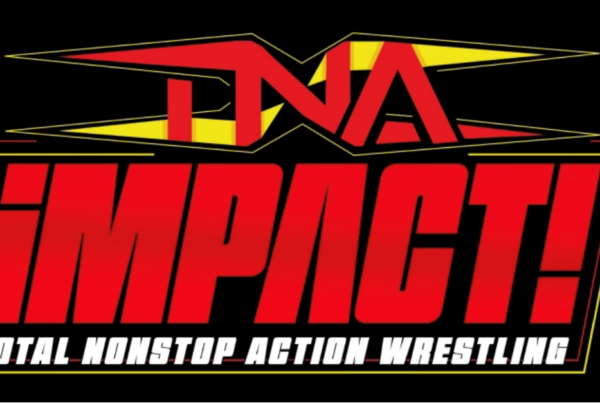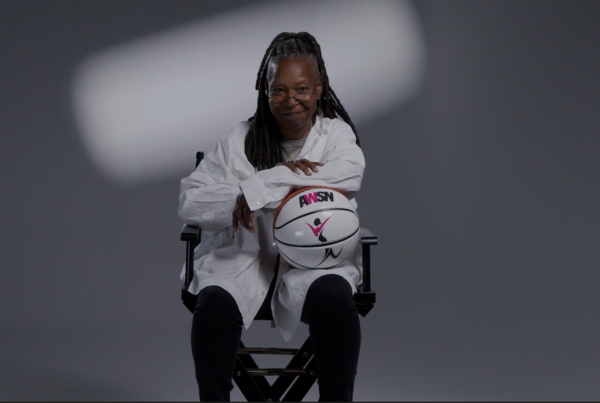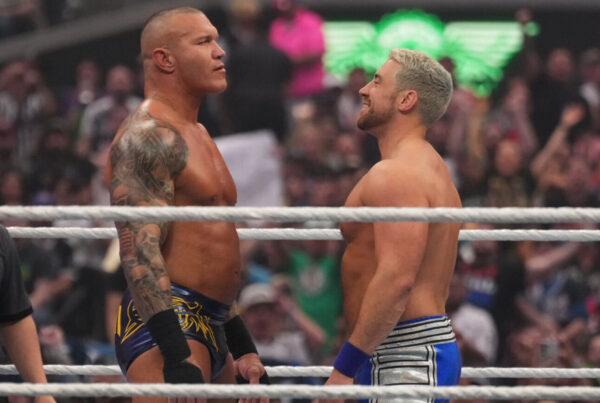
Swerve Strickland become All Elite Wrestling’s (AEW) first African American champion in company history. Strickland’s triumphant victory over professional wrestling legend, Samoa Joe, offered a storybook ending to a long journey for Strickland. Not only is it Swerve’s house, but it’s also his time. What’s the historical significance of Strickland’s victory at AEW Dynasty on April 21? Is his climb to the championship different than others? The low number of African American champions in professional wrestling would lead one to believe that Swerve’s victory provides another opportunity to highlight the lack of champions of color in the history of professional wrestling but have a discussion surrounding the topic.
Swerve did it his way
Strickland is a unique character on-screen and has the ability to connect with fans through his charisma and his captivating athleticism and skillset he displays. Strickland doesn’t seem to be portraying a character, instead he seems to be authentically himself and is unafraid of standing out from the crowd. That mentality has led fans to get behind Strickland, advocating for the star’s elevation into the main event scene of AEW. Strickland exudes his hip-hop influences, while also embracing the grunge culture of his native Pacific Northwest. This unique mash-up has given us a unique persona in wrestling, proving that not all characters have to fit into a mold.
Swerve’s journey has taken him from being a prominent star on the independent wrestling scene to being the champion in one of the major wrestling promotions. That journey hasn’t been devoid of bumps in the road. Most recently, he was released from WWE which led to his signing in AEW. The collective feeling when WWE released him was that the company never fully utilized his talent or allowed him to reach his full potential. The change in scenery for Strickland has allowed him to flourish, achieving his goal of being a top talent and the face of a major wrestling promotion. Strickland’s journey proved to fans, that if given the opportunity, he was capable of carrying the torch, leading the way for future talents to stay the course no matter how difficult or daunting the path may be.
Why this matters
As an African American man, seeing another African American reach the pinnacle of their profession brings me joy because those moments don’t happen as often as they should. Without going into a long history of how people of color have been treated throughout history, professional wrestling has presented many of the same hurdles to wrestlers as society has. Throughout the history of the wrestling business, there haven’t been many African American champions. Each time an African American wrestler is given the opportunity to shine and showcase their talents, it feels like it’s an event. It feels special because it’s a rare occurence. When Kofi Kingston had fans across wrestling interested in “Kofi-Mania”, WWE continued to remind us of the history of African American wrestlers in their company. To this point in the company’s history, they’ve only had 12 African American champions (6 men, 6 women). It seems that for every Kofi Kingston, we have five people like Junkyard Dog, M.V.P, 2 Cold Scorpio, Xavier Woods and Shelton Benjamin who haven never gotten to chase a major World Title…yet (in the case of Woods, Benjamin…even Scorpio).
With Strickland being AEW’s champion, and Moose carrying the flag for TNA Wrestling, and Trick Williams recently earning the NXT World Title, it feels like we are at a pivotal moment in professional wrestling for African Americans in the world title picture. So, when people ask why it matters, it’s because in the year 2024, we are still seeing African Americans reach the top of the mountain for the first time in the wrestling business or prominently featured on wrestling programming.
Another component to the importance of having African American champions is that representation matters. The future of wrestling rests on the eyes, ears and voices of the youth. There’s something special about seeing someone who looks like you, may have shared or similar life experiences, represented prominently in media or in entertainment. It allows us to see that it is possible to achieve our dreams or be given credit when we’ve accomplished great things. Seeing those examples not only provides motivation, but it has the potential for inspiring the next group of fans and possible talent for the wrestling business.
As a parent, I’m able to share my love of professional wrestling with my children. And now they’re falling in love with it in the same way. Whenever my children see an African American win a title or wrestle in a main event, they tell me “Daddy, that person looks like me” with excitement in their eyes. The removal of the glass ceiling for African Americans in wrestling truly means that anything is possible. It means that our champions will reflect our society’s diversity. It means that hopefully my children won’t root for a wrestler their entire career like I rooted for Junkyard Dog, and never see them have the opportunity to prove themselves on a massive stage or win a championship.
I remember seeing Ron Simmons defeat Vader and become the champion and I got similar feelings watching Strickland earn his title victory. Leap years shouldn’t be more frequent than seeing African American champions crowned. And I think we are heading in the right direction. It feels like anything is possible now in wrestling, including seeing champions of all races, creeds or backgrounds represent their companies as the champion.







